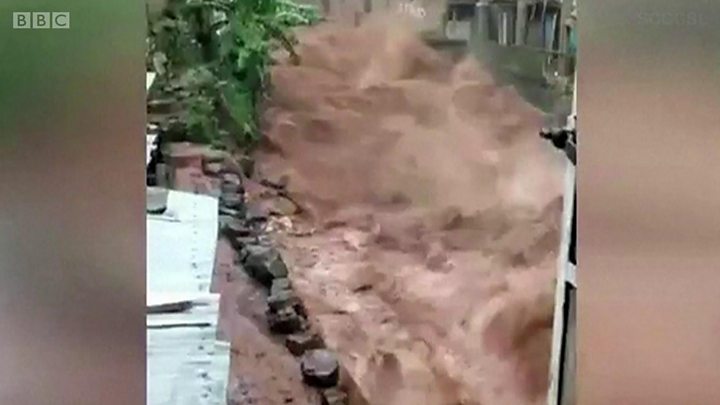At least 200 people have been killed in a mudslide near Sierra Leone's capital, Freetown, the Red Cross says.
A hillside in the Regent area collapsed early on Monday following heavy rains, leaving many houses covered in mud.
A BBC reporter at the scene said that many people may have been asleep when the mudslide occurred.
Sierra Leone's Vice-President Victor Bockarie Foh said it was "likely that hundreds are lying dead". The number of casualties is expected to rise.
Mr Foh told Reuters news agency that the disaster was "so serious that I myself feel broken". He said that the area had to be cordoned off as people were evacuated, with many still feared trapped in their homes.
Locals were reportedly trying to recover bodies from the rubble and mud with their bare hands.
The worst-hit area is thought to be the Regent district on the outskirts of Freetown, where dozens of houses were submerged when the hillside collapsed at about 06:00 GMT.

A Red Cross spokesperson said that at least 205 bodies had been taken to the central morgue in Freetown, Reuters reports.
Another spokesman for the Red Cross, Abubakarr Tarawallie, told the BBC that the organisation's volunteers and staff had been involved in search and rescue operations and that people affected were in immediate need of shelter and blankets.
He added that at least 100 properties had been submerged and that some had collapsed after a section of Sugar Loaf mountain came down before sunrise.
The AFP news agency later reported that the total death toll from flooding in and around the capital had risen to 312.
Hundreds of people are likely to be left homeless following the mudslide.
A Sierra Leonean disaster management official, Candy Rogers, said that "over 2,000 people are homeless" as a result of the mudslide in the Regent area, AFP reports.
Mr Rogers said that a huge humanitarian effort will be required to deal with the aftermath of the flooding.


Comments
Post a Comment